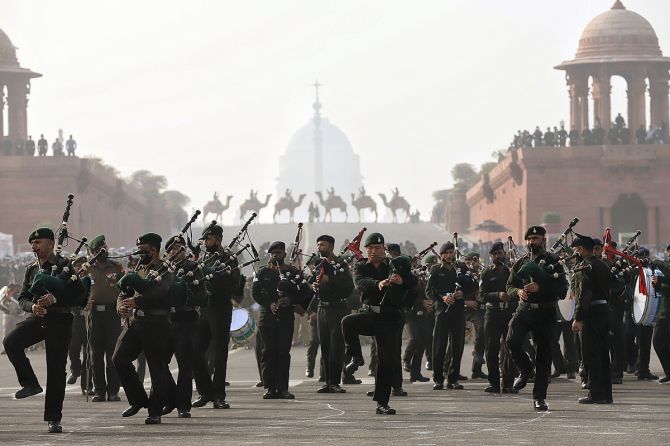The Centre decided to drop one of Mahatma Gandhi's favourite hymns Abide with me from this year's Beating Retreat ceremony as playing more Indian tunes would be appropriate in view of the Azadi ka Amrit Mahotsav, which celebrates the 75th year of India's Independence, government sources said on Sunday.

Abide with me, written by Scottish Anglican poet and hymnologist Henry Francis Lyte in 1847, had been part of the Beating Retreat ceremony since 1950. The Indian Army announced on Saturday that it has been dropped from this year's ceremony.
The sources said that the Centre wanted to include maximum number of Indian tunes and consequently, it was decided that only Indian-origin tunes will be played at this year's ceremony on January 29.
The Centre had in 2020 also planned to drop "Abide With Me" from the ceremony but had later retained it after an uproar.
For this year's ceremony, the hymn has been replaced by the popular patriotic song Ae mere watan ke logon, which was written by Kavi Pradeep to commemorate the supreme sacrifice made by Indian soldiers during the 1962 Indo-China war.
"Ae mere watan ke logo is an Indian tune and pays respect to all who laid their life for the safety and integrity of the nation, the sources noted.
The move to drop the hymn from this year's ceremony came days after the Centre's decision to merge the Amar Jawan Jyoti flame at the India Gate with the eternal flame of the National War Memorial.
The merger took place during a brief ceremony on Friday.
While some military officials defended the decision to merge the flame, several opposition parties, including the Congress accused the BJP-ruled Centre of 'removing history.'
Additionally, the Congress on Saturday attacked the government over the dropping of 'Abide With Me' from this year's Beating Retreat ceremony, alleging that it was another attempt to erase his legacy.
Government sources said on Sunday that the iconic tune and lyrics for Ae mere watan ke logon has a far wider connect with the people of India.
It is contextually far more appropriate to celebrate the valour and gallantry of the armed forces of India with Ae mere watan ke logon as compared to Abide with me hymn, they mentioned.
Phasing out tunes handed down from a colonial past and including tunes that have a wider and deeper connect with the people of India is an ongoing exercise, they mentioned.
Abide with me is a popular military tune but its lyrics are understood by a limited few, they stated.
Ae mere watan ke logon is a celebrated song with a massive universal appeal and it imbibes a sense of sacrifice and respect for those who have made supreme sacrifice for India in the last 75 years, they noted.
It is for this reason that in the 75th year of our independence, when we are celebrating Azadi ka Amrit Mahotsav, the Centre is making this change in the concluding performance of the Beating Retreat 2022, they noted.
The brochure released by the Indian Army on Saturday listed 26 tunes that will be played at this year's ceremony at Vijay Chowk.
The 26 tunes that will be played at this year's ceremony include Hey kanchha, Channa bilauri, Jai janam bhumi, Nritya sarita, Vijay josh, Kesaria banna, Veer siachen, Hathroi, Vijay ghosh, Ladaakoo, Swadeshi, Amar chattan, Golden arrows and Swarn jayanti, according to the brochure.
Veer sainik, Fanfare by buglers, INS India, Yashasvee, Jai Bharati, Kerala, Siki a mole, Hind ki sena, Kadam kadam badhaye ja, Drummers call besides Ae mere watan ke logon are also part of the tunes that will be played on the evening of January 29, the brochure noted.
The ceremony will see the participation of 44 buglers, 16 trumpeters and 75 drummers.
Beating Retreat is a centuries-old military tradition dating from the days when troops disengaged from the battle at sunset, it said.
As soon as the buglers sounded the retreat, the troops ceased fighting, sheathed their arms and withdrew from the battlefield, it added.
Beating Retreat marks the end of nearly week-long festivities of Republic Day, which used to begin on January 24. But this year, the celebrations will begin on January 23, the birth anniversary of Netaji Subhash Chandra Bose.
Ahead of Bose's 125th birth anniversary, Prime Minister Narendra Modi had on Friday announced that a grand statue of the iconic freedom fighter will be installed at India Gate as a symbol of India's "indebtedness" to him.
Till the statue, made of granite, is completed, a hologram statue of his would be present at the same place, he said, adding that he will unveil the hologram statue on Sunday.










